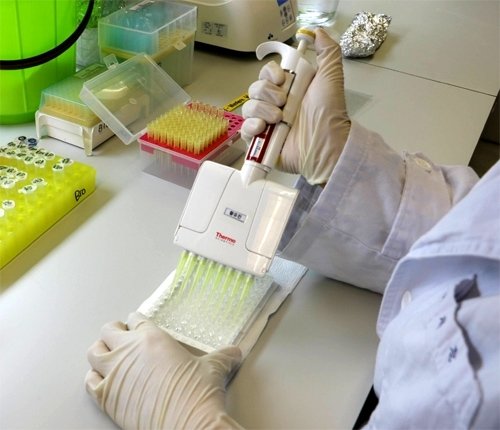Korean researchers develop blood-based test for colorectal cancer
Korean researchers develop blood-based test for colorectal cancer
Posted May. 25, 2016 07:37,
Updated May. 25, 2016 07:42

Hong's diagnosis kit diagnoses colorectal cancer with a drop (a milliliter) of a person's blood. Previous diagnosis kits estimate cancer occurrence rates by finding cancer DNA from the blood, making it difficult to find it if there is no mutative genes that make cancer even if a person is suffering from cancer.
The blood-based test kit that Korean scientists discovered measures the amount of immune cells in blood that fight against colorectal cancer, and thus is not affected by the examinee's genetic and biological condition.
The team carried out a study on 762 people with a research team at HMR Hospital in Montreal, Canada to find out the accuracy of the examination. As a result, 18 colorectal cancer cases have been found with the use of the diagnosis kit. Among the 762 people, people confirmed to have colorectal cancer numbered 21 through virtual colonoscopy and CT, with accuracy rate reaching 87.5 percent.
The Korean government supports with examination costs for the first screening inspection process of colorectal cancer, called tests for occult blood in feces, for people aged 50 and older, which is a part of the national cancer screening. However, this test often fails to screen early colorectal cancer patients. When colorectal cancer progresses, the tumor, which has grown increasingly big, drops off from the large intestine causing bleeding. When the colorectal cancer is at an early stage the tumor is not big enough to cause bleeding, making it difficult to discover it at the occult blood in feces test.
Therefore, most cancer experts recommend endoscopic examination of large intestine. "The medical sector recommends endoscopic examination of large intestine instead of occult blood in feces test that has just 30 percent of accuracy, but the share of people taking this check-up is much lower than those taking the upper GI endoscopy due to fear," said Yoon Yong-sik, professor and medical doctor of colorectal surgery at Seoul Asan Hospital.
The American Gastroenterological Association said Dr. Hong's team showed accuracy rate of over 80 percent, which allowed the outcome to be selected as one of medical advances to watch this year. The new discovery can serve as an alternative to occult blood in feces test has high misdiagnosis and burdensome endoscopic examination. "The diagnosis kit can be used to sort out people who really need to take endoscopic examination," Dr. Hong said. "The diagnosis kit of our team will contribute to raising survival rate of colorectal cancer."
김단비기자 kubee08@donga.com







